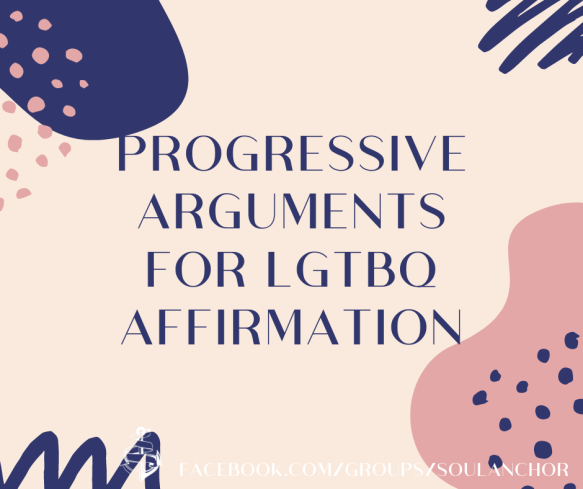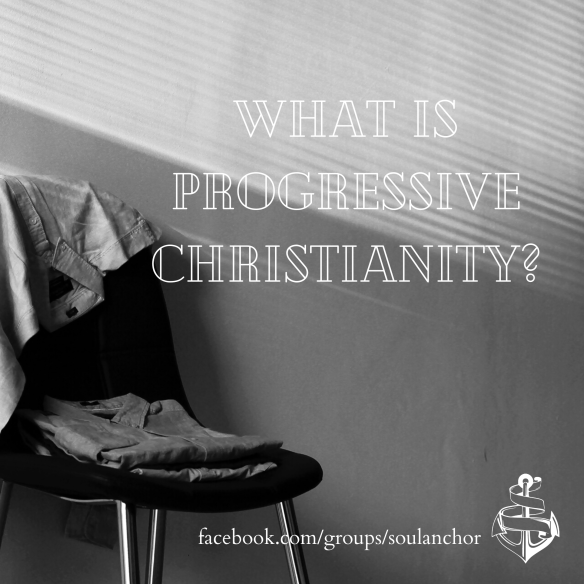Progressive Christian arguments for LGBTQ affirmation
Reposted from the Facebook group SoulAnchor- request to join here: http://facebook.com/groups/soulanchor
It’s an experience that has become all too common: a Christian friend suddenly comes out in affirmation of LGBTQ ideology, begins to celebrate homosexuality and transgenderism, and perhaps, eventually, even “comes out” themselves. Other deviations from traditional Christianity tend to follow suit: radical feminism, shades of Marxism, etc.
Often loved ones are left reeling and wondering “what happened?!”
Something absolutely essential that we have to understand about the appeal of Progressive Christianity for many is the appeal to the emotions. A few days ago in the group Angie shared a video from someone formerly deep in Critical Theory who mentioned that one of the best ways to help someone emerge from these false teachings is to appeal to their emotions.
Progressive Christians tend to be highly empathetic people who care deeply about the feelings and well-being of others. This is, at its roots, a reflection of the image of God. But we can see clearly that the Enemy exploits it and twists the Word of God to capture them into a false way of looking at scripture, and thus the world, in order to shipwreck their faith.
HOW DO PROGRESSIVE CHRISTIANS VIEW HOMOSEXUALITY IN THE BIBLE?
Here is a brief list (probably not exhaustive, either) of common objections to the traditional Christian view that homosexuality is a sin. We are not going to take the time to answer each objection in depth here or this post will stretch down to the floor, so check the comments for some links to helpful resources.
Paul vs. Jesus
This (false) dichotomy is an important one for many Progressives. Discrediting Paul’s authority makes it easier to ignore or downplay his commands and proclamations about homosexuality. Commonly you’ll hear “Jesus never said anything about homosexuality”. But consider, overall, Jesus’s view of the scriptures. Did he have a high view of scripture, or a low view? Did he consider it authoritative? Did he allow for picking and choosing? Did he model such behavior?
Word games
One of the words Paul uses to refer to homosexuality in the New Testament, arsenokoitai, is a notoriously difficult word for some because this is the first preserved use of the word in literature. From an article (linked in the comments) on Stand to Reason: “[The word] arsenokoitai (translated “homosexual”)—[was made] by combining two words, arsenos, for “male,” and koiten, meaning “to bed.” Arsenokoitai literally means “bedders of males” or “men who bed with males.”
Why this combination of words? Because these are the very words found in the Septuagint—the Greek translation of the Old Testament regularly used by the Apostles—to describe the homosexual behavior explicitly forbidden in Lev. 18:22 and 20:13”
The Levitical laws
You’ve probably heard this one- “Sure, Leviticus forbids homosexuality, but it also forbids wearing mixed fibers, and I don’t see any Christians following these laws anymore.” This argument fails to draw a distinction between the moral Law and the ceremonial (and sundry) Law. Christians under the new covenant are still accountable to obey the moral Law. Will we fail sometimes? Yes. That is what the blood of Jesus is for. But Jesus made it clear that the Law had not been abolished, and that teaching others to disobey God’s moral Law was wrong. (Matthew 5:17-19)
Paul didn’t know about “true” homosexuality
Another common argument is that Paul was referring to rape, to heterosexuals pursuing homosexual sex (“outside the bounds of their orientation”), or to pedophilia exclusively. The argument goes that homosexuality as an actual orientation, and a “loving” same-sex union, would be allowed. See the link in the resource section below “A Reformation the Church Doesn’t Need” for a treatment of this argument.
Resources for Further Study
ARTICLES:
Paul on Homosexuality (STR) https://www.str.org/w/paul-romans-and-homosexuality-1
A Reformation the Church Doesn’t Need Part 1: https://www.str.org/w/a-reformation-the-church-doesn-t-need-part-1
Part 2: https://www.str.org/w/a-reformation-the-church-doesn-t-need-part-2
Books by Christians who formerly practiced homosexuality and have BEAUTIFUL testimonies of Jesus’s saving grace:
The Gospel Comes with a Housekey (Rosaria Butterfield)
The Secret Thoughts of an Unlikely Convert (Rosaria Butterfield)
Holy Sexuality (Christopher Yuan)
Out of a Far Country (Christopher Yuan and Angela Yuan)
Also check out Nancy Pearcy’s LOVE THY BODY: Answering Hard Questions About Life and Sexuality for the connections between homosexuality, LGBTQ rights, transgenderism, radical feminism, and how Christians should understand these views and respond in a Christlike manner.
AUDIO:
Dr. James White: The Holiness Code for Today https://www.sermonaudio.com/search.asp?currSection=sermonstopic&keyword=Holiness+Code+for+Today&keyworddesc=Holiness+Code+for+Today&seriesOnly=true&sourceid=phxrefbap (especially the messages Blooduiltiness and Arsenokoites, and Sex and the Law of God)
A Gay Man’s Story of Redemption with Becket Cook: https://podcasts.apple.com/us/podcast/71-a-gay-mans-story-of-redemption-with-becket-cook/id1260262855?i=1000477030525
Why Does God Care Who I Sleep With? With Sam Allberry: https://podcasts.apple.com/us/podcast/67-why-does-god-care-who-i-sleep-with-with-sam-allberry/id1260262855?i=1000471463233
Holy Sexuality and the Gospel with Christopher Yuan: https://podcasts.apple.com/us/podcast/40-holy-sexuality-and-the-gospel-with-christopher-yuan/id1260262855?i=1000427727060
The Big Six (And Why They Matter): https://www.sheologians.com/the-big-6-why-they-matter/
The Big Six (And Why They Matter) Part Deux: https://www.sheologians.com/the-big-6-why-they-matter-part-deux/









